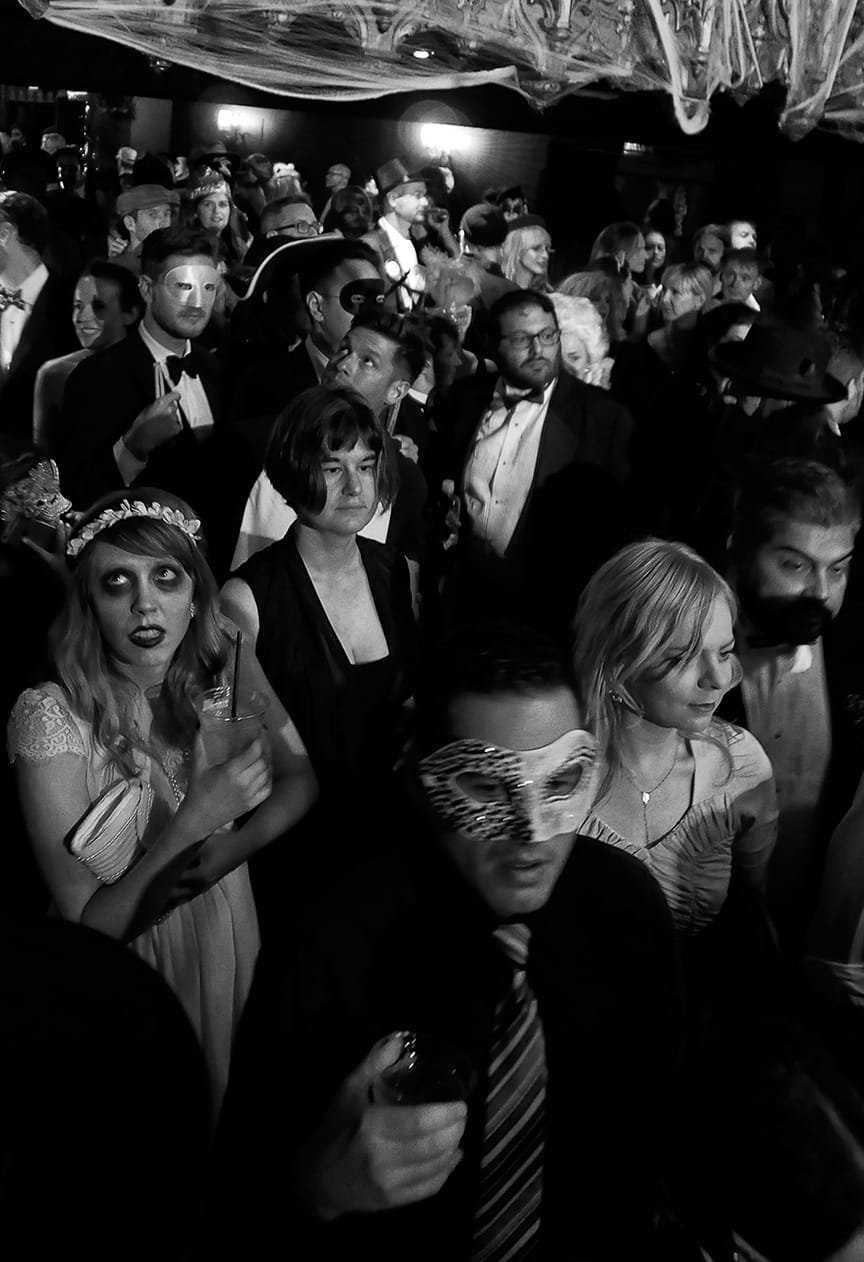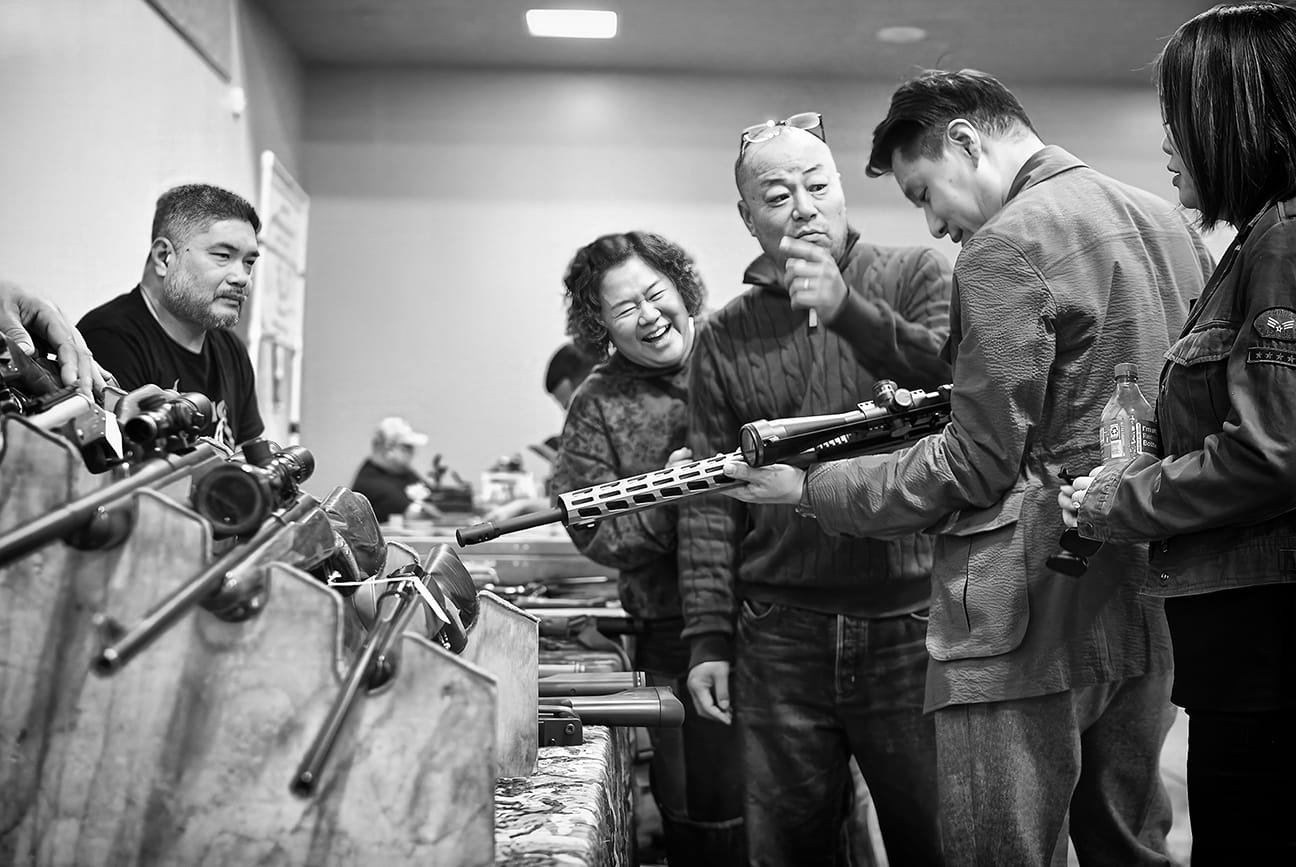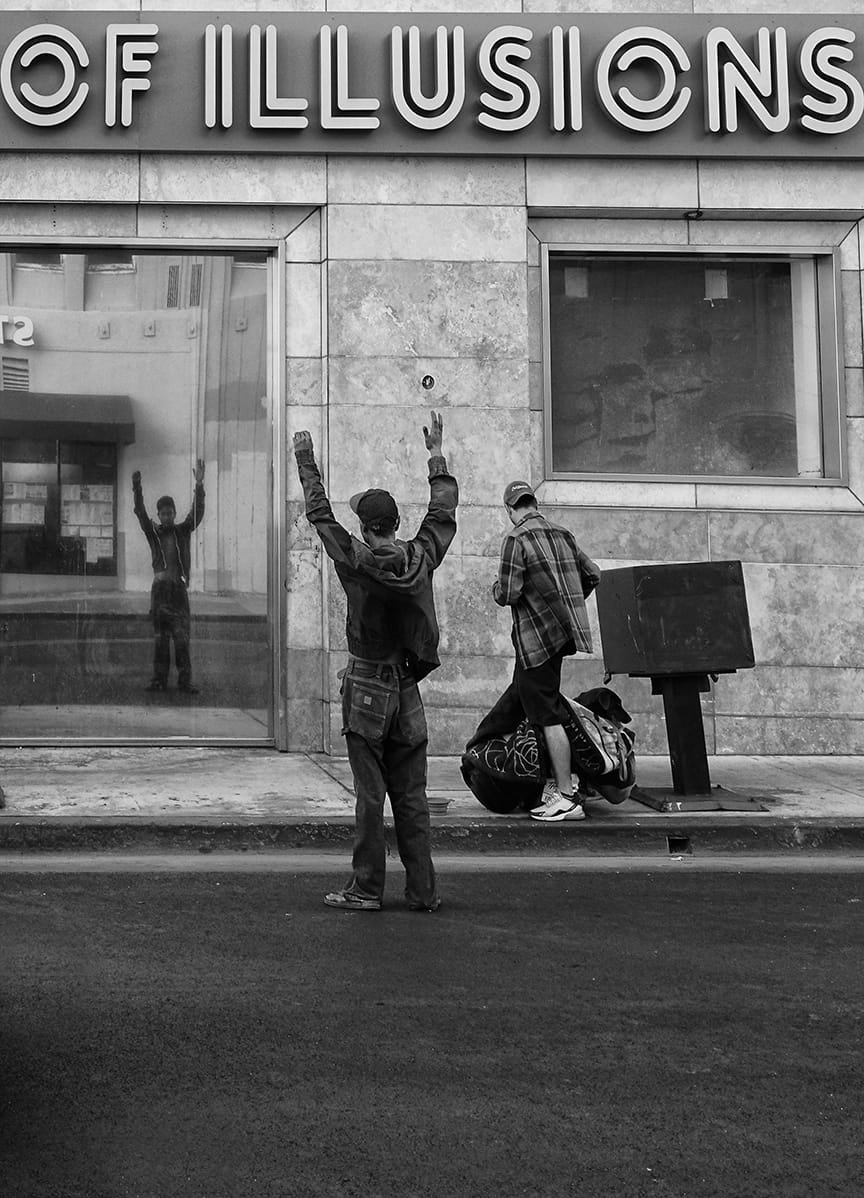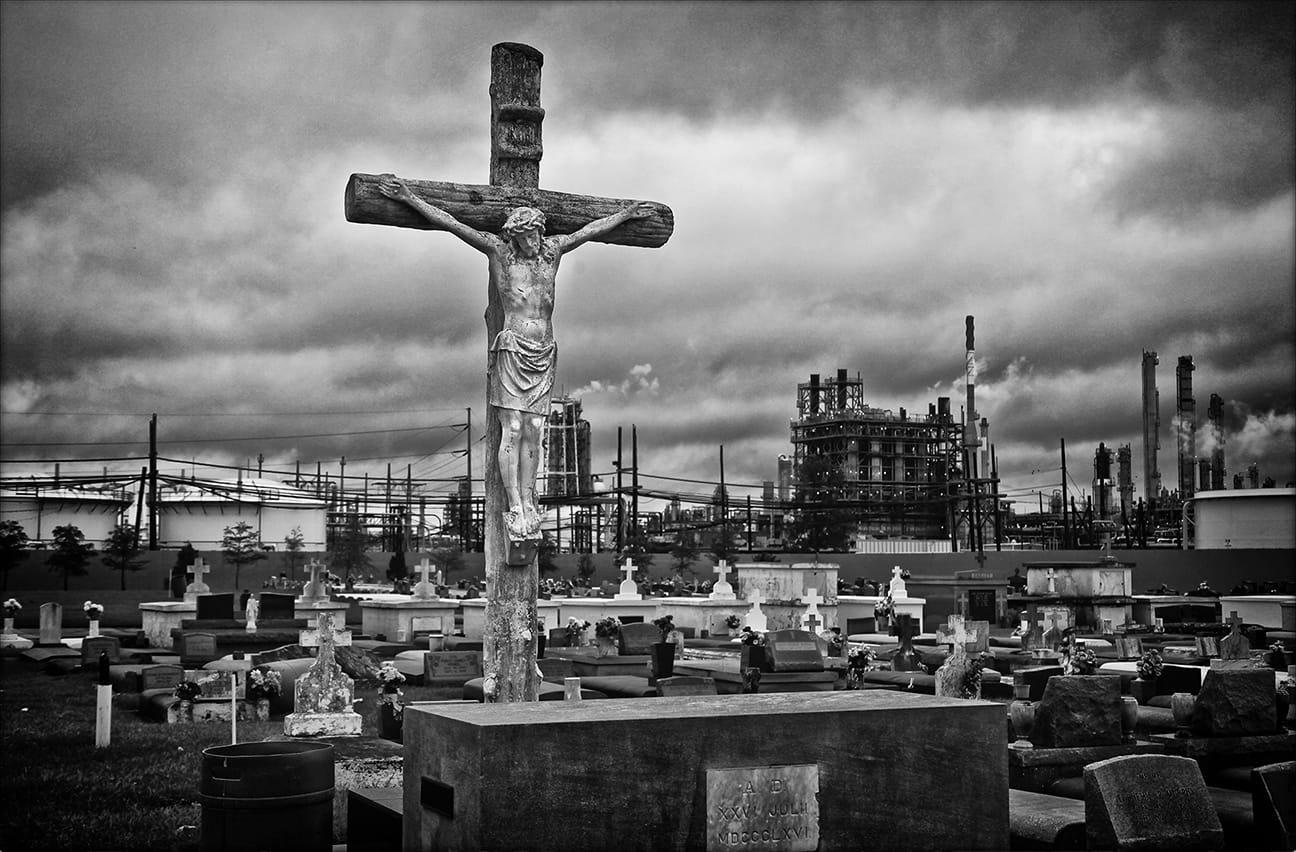The End is Near, Here
ca. 20 × 25 cm
ca. 176 pages, ca. 120 ills.
Text by F. Scott Hess
English/German
Design: Jan Spading, Lüneburg
Softcover with multi-wrapped cover
ISBN 978-3-96070-116-3
In this second book, Dressel continues to portray his Los Angeles as a reflection of the broader American society. I must admit that this book is quite unsettling; while it doesn’t uncover any new truths, it presents familiar realities in a way that is impossible to ignore. The book is a poignant collection of black-and-white photographs that highlight a period of significant political division and a crisis in moral, social, and psychological aspects within the United States.
This book is not only a stunning collection of photographic art, but it is primarily a work of documentary photography. In a world flooded with glamorous images that help us escape reality, we need this kind of honest representation now more than ever. It prevents us from becoming like ostriches with our heads buried in the sand. The interpretation of his photographs as either prophetic or preventative ultimately lies with the viewer. Nonetheless, examining them more closely proves worthwhile.
“The elements that jump at me everywhere are poverty and decay, extreme nationalism, omnipresent religion of the kind that would be considered psychopathic cults in other places, gun craziness combined with aggressive paranoia and general moral decay. Not a happy combination. Weirdly, it seems those who are the most obvious illustrations of that decay are the ones who pretend to resist and reverse it. I feel strongly that the country has arrived at a turning point, and I am full of dread about what that turn will look like.”
“I call the form of capitalism we have here now ‘post-competitive cannibalism,’ which is not working for a vast part of the population. That creates a lot of anger, which is channelled by unscrupulous politicians, preachers, media types, and other parasites. The forces that keep the system going don’t offer meaningful improvement for the lives of ordinary people, so they exploit cultural issues to divide the populace and stay in control. That has turned the country into a completely dysfunctional shit show full of hateful nastiness and grotesque stupidity,” the photographer summarises harshly. He also sees no hope of improvement in the future. “I feel strongly that the country has arrived at a turning point, and I’m full of dread about what that turn will look like.”
Michael Dressel
“The American landscape of the West displays for me the hardness and mercilessness of the universe. Sometimes you might as well be on Mars and, in a way, you are.”
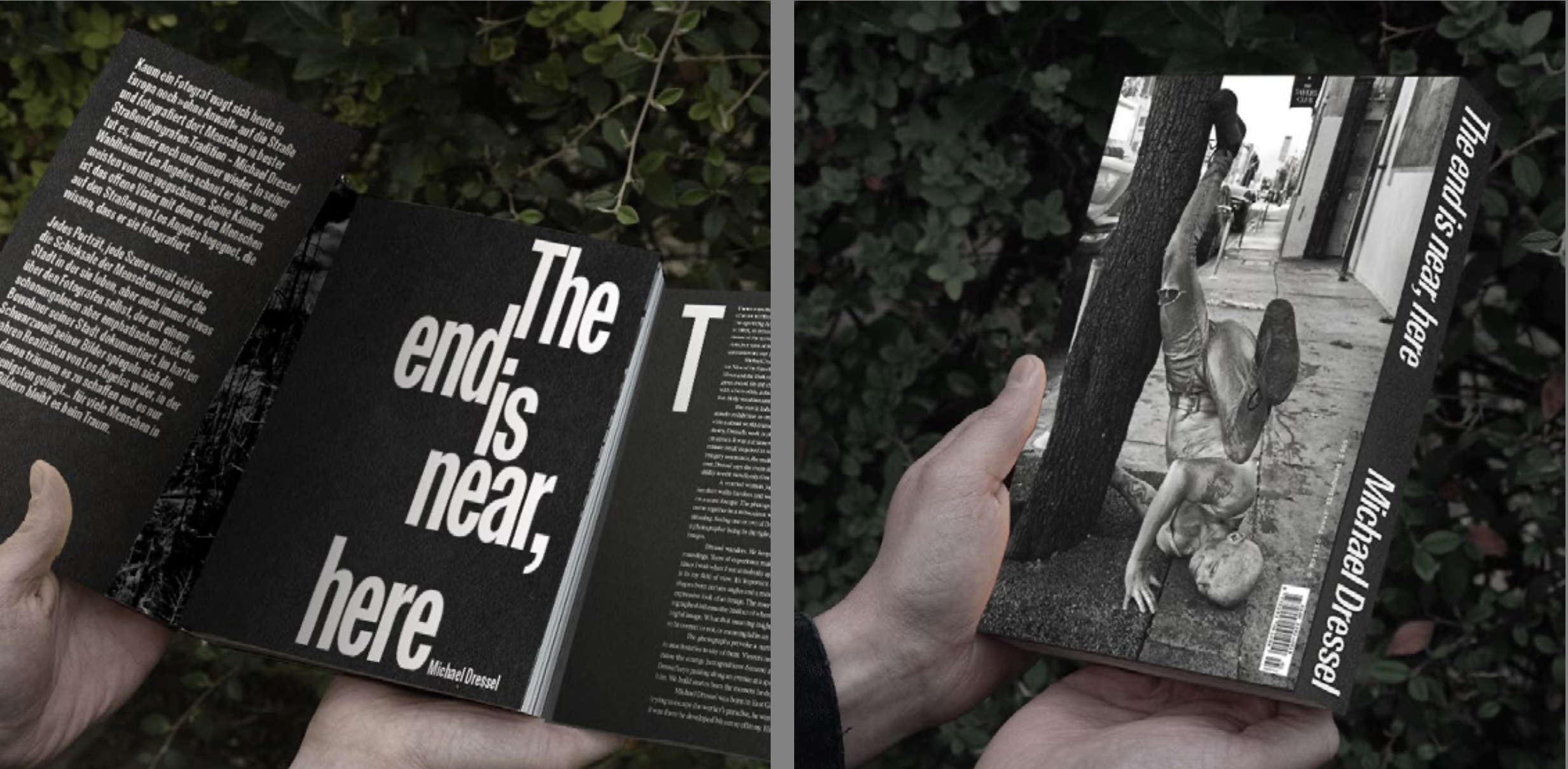

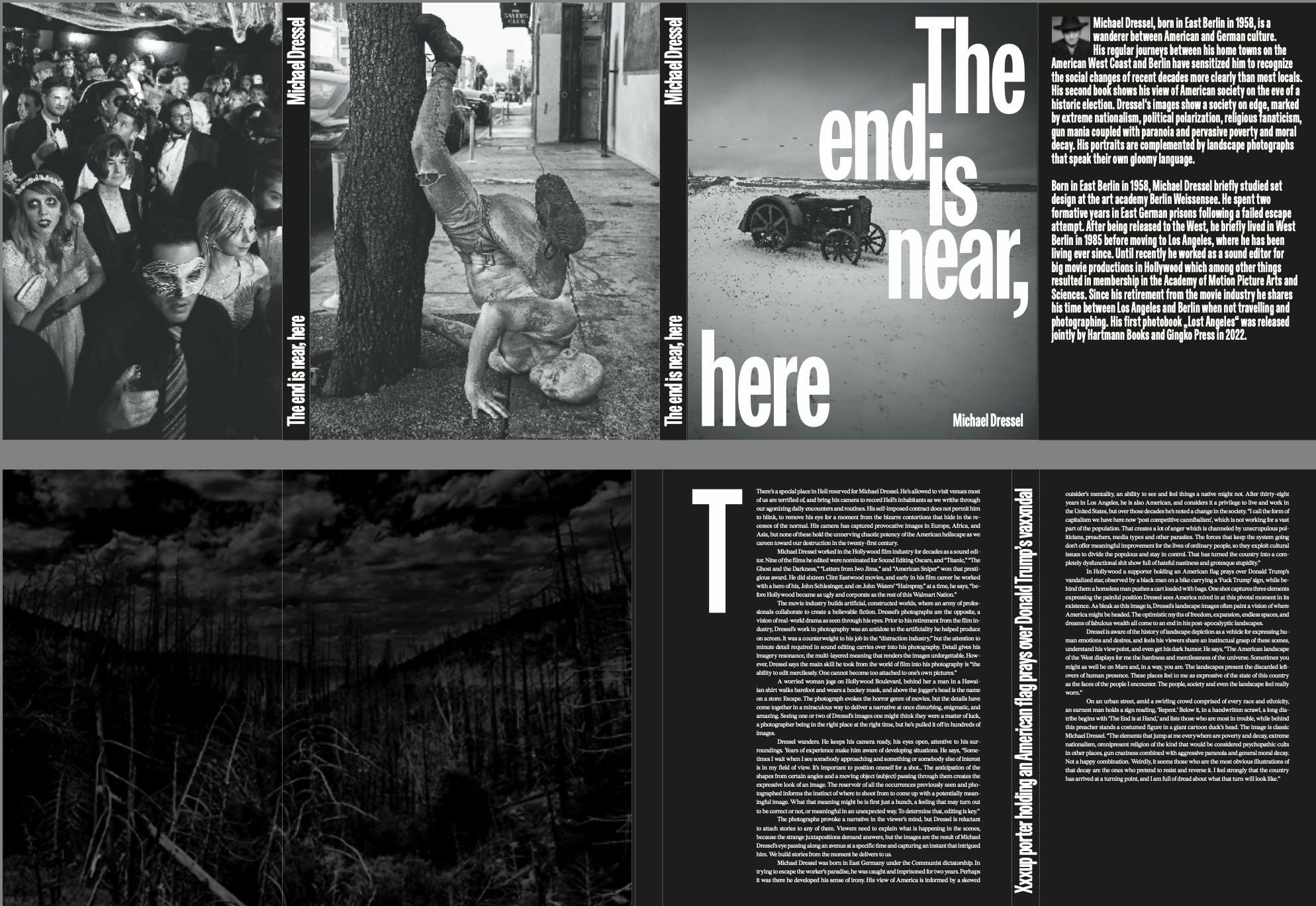

There’s a Special Place in Hell , by F. Scott Hess
There’s a special place in hell reserved for Michael Dressel. He’s allowed to visit venues most of us are terrified of and bring his camera to record hell’s inhabitants as we writhe through our agonizing daily encounters and routines. His self-imposed contract does not permit him to blink, to remove his eye for a moment from the bizarre contortions that hide in the recesses of the normal. His camera has captured provocative images in Europe, Africa, and Asia, but none of these hold the unnerving chaotic potency of the American hellscape as we careen toward our destruction in the twenty-first century.
Michael Dressel worked in the Hollywood film industry for decades as a sound editor. Nine of the films he edited were nominated for sound editing Oscars, and Titanic, The Ghost and the Darkness, Letters from Iwo Jima, and American Sniper won that prestigious award. He did sixteen Clint Eastwood movies, and early in his film career he worked with a hero of his, John Schlesinger, and on John Waters’s Hairspray, at a time, he says, “before Hollywood became as ugly and corporate as the rest of this Walmart Nation.”
The movie industry builds artificial, constructed worlds, where an army of professionals collaborate to create a believable fiction. Dressel’s photographs are the opposite, a vision of real-world drama as seen through his eyes. Prior to his retirement from the film industry, Dressel’s work in photography was an antidote to the artificiality he helped produce on screen. It was a counterweight to his job in the “distraction industry,” but the attention to minute detail required in sound editing carries over into his photography. Detail gives his imagery resonance, the multilayered meaning that renders the images unforgettable. However, Dressel says the main skill he took from the world of film into his photography is “the ability to edit mercilessly. One cannot become too attached to one’s own pictures.”
A worried woman jogs on Hollywood Boulevard, behind her a man in a Hawaiian shirt walks barefoot and wears a hockey mask, and above the jogger’s head is the name on a store: Escape. The photograph evokes the horror genre of movies, but the details have come together in a miraculous way to deliver a narrative at once disturbing, enigmatic, and amazing. Seeing one or two of Dressel’s images one might think they were a matter of luck, a photographer being in the right place at the right time, but he’s pulled it off in hundreds of images.
Dressel wanders. He keeps his camera ready, his eyes open, attentive to his surroundings. Years of experience make him aware of developing situations. He says, “Sometimes I wait when I see somebody approaching and something or somebody else of interest is in my field of view. It’s important to position oneself for a shot . . . The anticipation of the shapes from certain angles and a moving object (subject) passing through them creates the expressive look of an image. The reservoir of all the occurrences previously seen and photographed informs the instinct of where to shoot from to come up with a potentially meaningful image. What that meaning might be is first just a hunch, a feeling that may turn out to be correct or not, or meaningful in an unexpected way. To determine that, editing is key.”
The photographs provoke a narrative in the viewer’s mind, but Dressel is reluctant to attach stories to any of them. Viewers need to explain what is happening in the scenes, because the strange juxtapositions demand answers, but the images are the result of Michael Dressel’s eye passing along an avenue at a specific time and capturing an instant that intrigued him. We build stories from the moment he delivers to us.
Michael Dressel was born in East Germany under the Communist dictatorship. In trying to escape the worker’s paradise, he was caught and imprisoned for two years. Perhaps it was there he developed his sense of irony. His view of America is informed by a skewed outsider’s mentality, an ability to see and feel things a native might not. After thirty-eight years in Los Angeles, he is also American, and considers it a privilege to live and work in the United States, but over those decades he’s noted a change in the society. “I call the form of capitalism we have here now ‘postcompetitive cannibalism,’ which is not working for a vast part of the population. That creates a lot of anger, which is channeled by unscrupulous politicians, preachers, media types, and other parasites. The forces that keep the system going don’t offer meaningful improvement for the lives of ordinary people, so they exploit cultural issues to divide the populous and stay in control. That has turned the country into a completely dysfunctional shit show full of hateful nastiness and grotesque stupidity.”
In Hollywood a supporter holding an American flag prays over Donald Trump’s vandalized star, observed by a black man on a bike carrying a “Fuck Trump” sign, while behind them a homeless man pushes a cart loaded with bags. One shot captures three elements expressing the painful position Dressel sees America mired in at this pivotal moment in its existence. As bleak as this image is, Dressel’s landscape images often paint a vision of where America might be headed. The optimistic myths of freedom, expansion, endless spaces, and dreams of fabulous wealth all come to an end in his postapocalyptic landscapes.
Dressel is aware of the history of landscape depiction as a vehicle for expressing human emotions and desires, and feels his viewers share an instinctual grasp of these scenes, understand his viewpoint, and even get his dark humor. He says, “The American landscape of the West displays for me the hardness and mercilessness of the universe. Sometimes you might as well be on Mars and, in a way, you are. The landscapes present the discarded leftovers of human presence. These places feel to me as expressive of the state of this country as the faces of the people I encounter. The people, society and even the landscape feel really worn.”
On an urban street, amid a swirling crowd comprised of every race and ethnicity, an earnest man holds a sign reading, “Repent.” Below it, in a handwritten scrawl, a long diatribe begins with “The End is at Hand,” and lists those who are most in trouble, while behind this preacher stands a costumed figure in a giant cartoon duck’s head. The image is classic Michael Dressel. “The elements that jump at me everywhere are poverty and decay, extreme nationalism, omnipresent religion of the kind that would be considered psychopathic cults in other places, gun craziness combined with aggressive paranoia and general moral decay. Not a happy combination. Weirdly, it seems those who are the most obvious illustrations of that decay are the ones who pretend to resist and reverse it. I feel strongly that the country has arrived at a turning point, and I am full of dread about what that turn will look like.”
Michael Dressel briefly studied set design at the Berlin Weissensee art academy. After spending two years in East German prisons following a failed escape attempt, he moved to Los Angeles in 1985 where he worked as a sound editor for Hollywood productions. Now retired, he splits his time between Los Angeles and Berlin, and has recently released his first photobook, "Lost Angeles."
According to Dressel, the American West's landscapes and people reflect the country’s harsh and worn nature.
Foto © Wolf Heider-Sawall


